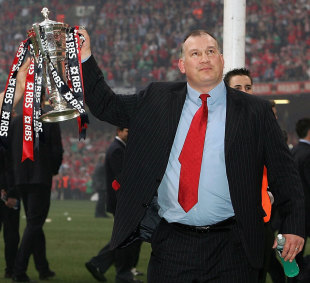|
2006 Six Nations:
A beacon extinguished in the Welsh game
Huw Richards
February 15, 2006

Mike Ruddock led Wales to the 2005 Six Nations grand slam
© Getty Images
Enlarge
To be a Welsh rugby follower today is once more to feel the anger and despair that had been refreshingly absent over the past year or so. Perhaps there was an element of fool's paradise in that sense of well-being. The jury is still out, to put it mildly, on a regional structure that has failed to produce a Heineken quarter-finalist in consecutive seasons. The Millennium Stadium remains an overrated money pit - a success measured only by comparison with the truly monumental cock-up that is Wembley. One thing alone lightened the darkness - the performances of the national team under Mike Ruddock, in particular a Grand Slam won in a style many of us feared was lost beyond recall. Ruddock's going has been as dignified as his tenure, his desire to limit fall-out and consequent damage in marked contrast to Sir Clive Woodward's petulant England exit. His statement that his reasons were family-based, with the job creating pressures he was not prepared to tolerate, has to be accepted. The question that remains concerns the nature of those pressures. The timing of his going is highly suggestive - only a week after he had been publicly isolated by failing to support his players' attempt (regrettably successful) to dictate to a news organisation who could and could not report for them. There have also been rumblings of player discontent. One has to wonder why. It is of course one of the oldest conundrums in sport to establish who is and is not a good coach, and precisely what it is they bring to the role that matters. But if a coach goes to a succession of teams and improves them all in a manner that shows a consistency of approach, it is fair to conclude that they are getting something right. In his progression from Swansea via Leinster, Ebbw Vale, Wales A and Gwent-Newport Dragons to Wales, Ruddock has unfailingly produced better teams who combine competence in the basic disciplines with the freedom of style that comes from allowing players to think and act for themselves. It is a fair bet that his departure from Wales will be followed in some quarters by the sort of revisionism applied post-England to Woodward - the accusation that he was the fortunate beneficiary of somebody else's work. For one Johnson, Martin, most probably read another, Scott. The Australian skills coach's contribution to Wales 's success has always been readily acknowledged by Ruddock. But Johnson was also there during the far less successful and free-flowing Steve Hansen era. Hansen's work spotting talent and inculcating technique certainly contributed to last year's success. But not even his most dedicated admirer will argue that it would have happened had he stayed. The real upturn came with the arrival of Ruddock and the return of Clive Griffiths as defence coach. It was Ruddock who spotted both Gareth Thomas's potential as a leader - making possible the extraordinary rise to Lions captain and all the well-deserved encomia heaped upon Alfie in the last months - and an ideal deputy in Michael Owen (who, it is oddly already forgotten, was the actual Grand Slam captain). He reintroduced Gavin Henson and called up Ryan Jones. Rather more than the 'couple of good calls' that were the most Ruddock would claim for himself. For Johnson the challenge will be to adjust from the warm 'everybody's friend and father confessor' role characteristic of the good number two to the more distant, detached and inevitably less popular role of the boss - the football coach who said his job was to stop the half of his squad who hated his guts winning over the half who couldn't make their minds up touched on one of the post's eternal verities. A group of players who have been regarded with unconditional affection will have to do very well, after appearing to topple Wales 's best coach in a generation or more, to recapture that status. And the Welsh Rugby Union once more sets off on the quest for a new coach. Johnson, who at least appears free of antipodean control-freakery, has three games to make his case, if indeed he wants to. Ruddock is not the only coach with family concerns, and Johnson's appear to be pulling him back in the direction of Australia . So who else ? None of the regions is doing remotely well enough to make a compelling case for its coach and while Gareth Jenkins remains perennially appointable, is he going to want to try again after his very public humiliation in 2004 ? Nor do Phil Davies's current travails at Leeds constitute overwhelming credentials. Among non-Welshmen it is mandatory at this point in discussing any national coaching vacancy to mention Nick Mallett. And of course Sir Clive might be on the market again before very long.. (No, I can't see it either. But well worth suggesting, if only to see the reactions). But who in their right mind is going to want the job ? That most national coaching posts damage those who fail is a given, something that one accepts along with the appointment. This, as Ruddock has discovered in succession to Tony Gray and Alan Davies, is the one that devours its successes as well. © ESPN Sports Media Ltd.
|
Live Sports
Communication error please reload the page.
-
Football
-
Cricket
-
Rugby
-
- Days
- Hrs
- Mins
- Secs
F1 - Abu Dhabi GP
Abu Dhabi Grand Prix December 11-131. Max Verstappen ()
2. Valtteri Bottas (Mercedes)
3. Lewis Hamilton (Mercedes)
4. Alexander Albon ()
5. Lando Norris ()
6. Carlos Sainz Jr ()
-
ESPNOtherLive >>
Darts - Premier League
Golf - Houston Open
Snooker - China Open
Tennis - Miami Open

